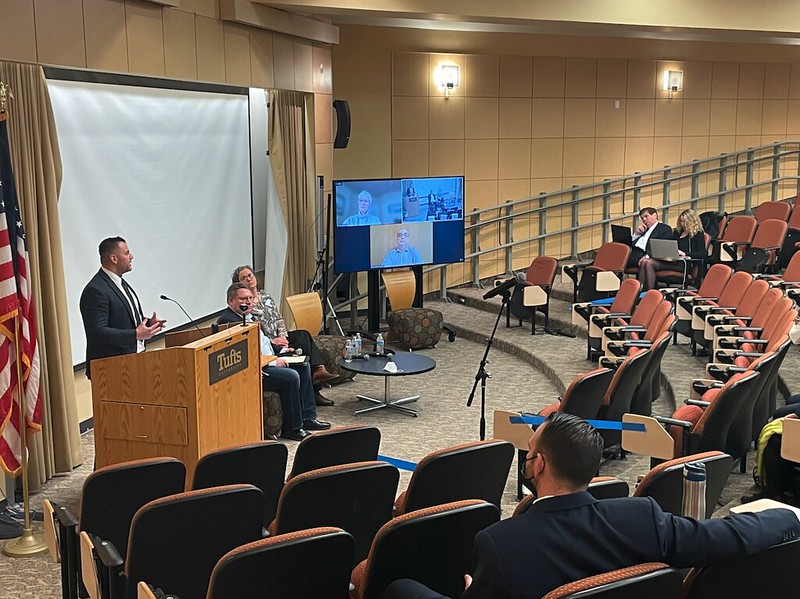
Decoding Arctic governance future amid the Russian Invasion of Ukraine
By Vishal Manve, MALD 2023 Candidate, The Fletcher School
On Friday, April 8, 2022, The Fletcher School convened the 11th iteration of the Fletcher Arctic Conference with the theme, The Future of Governance in the Arctic. Amidst the Russian invasion of Ukraine and the Russian Federation’s role as the chair of the Arctic Council, the Fletcher community and academic experts acknowledged the subsequent foreign policy ramifications for the Arctic region.
The theme of this year’s conference focused on the future of governance in the Arctic and included panel discussions on topics such as “Diplomacy in the Arctic”, “International Legal Regime in the Arctic,” and “Current state of Governance in the Arctic.” The Fletcher School’s Dean Rachel Kyte gave an opening remark, kickstarting the sessions at the ASEAN Auditorium.
In his welcoming remarks, Professor Rockford Weitz, Director of Fletcher’s Maritime Studies Program, highlighted the unique challenges facing the Arctic region today amid the Russian invasion of Ukraine, and its eventual isolation by other seven members of the Arctic Council resulting in an impasse and suspension of the council’s operations.
Member countries include Finland, Sweden, Norway, Iceland, Canada, Denmark, and the United States. The council is aimed at ensuring collaboration between countries with Arctic territories and does not deal with security issues.
The first session was moderated by Gini Staab, Resident State Department Fellow at the Fletcher School, and included seasoned panelists Dr. Alan Henrikson, Joanie Simon, Ambassador Robert Barber, and Anders Oskal.
“The seven non-Russia members of the Arctic council issued a statement suspending relations with Russia in the context of the Arctic Council. This pause, condemning Russia, is the first time it has happened in the 26-year history of the Arctic Council,” Ambassador Robert Barber said.
He further added that issues in the Arctic Council would persist and that the “Arctic Seven” would collaborate with non-Russian Arctic nations in the context of Russia’s invasion to express their opposition.
Meanwhile, Anders Oskal, Secretary-General of World Reindeer Herders, stated how over 24 different nomadic and indigenous groups existed with myriad perspectives and spread over 10 national states.
“We have a long history in the Arctic. Our collaboration on Arctic issues was made possible by the fall of the Iron Curtain in the East and now we are entering a new era with another Iron Curtain in the West,” Oskal further added.
The panelists further highlighted how despite solidarity among the Arctic seven, half of the territory in the Arctic is under the Russian Federation, thereby highlighting the urgent need to get “all eight countries that are part of the council together.”
Meanwhile, professor Rockford Weitz moderated the third panel on “Current state of governance in the Arctic” and was joined by panelists Dr. Andrei Zagorski, Dr. Walter Berbick, Sierra Fletcher, and Fram Ulmer.
Delving deeper into the Russian invasion’s impact on the Arctic Council, Fran Ulmer, former chair of the U.S. Arctic Research Commission, stated how multiple agreements have been reached for collaborations in the Arctic but are at risk of facing a collapse amid the ongoing escalations.
“This relationship between eight Arctic Council members and indigenous communities has set the foundation for cooperation for 30 years and has been impacted by the Russian invasion of Ukraine,” she added.
She illustrated how the Arctic was crucial to “understanding changes to the global environmental systems due to climate change.”
Both Sierra Fletcher, Principal at Nuka Research, and Ulmer agreed that essential work “needed to be completed in order to prevent loss of momentum in cooperation” as the Arctic Council currently faced suspension.
“Since the fall of the USSR, the peace in the Arctic region has never been challenged in this way before and there is real potential for international conflict which does not exclude the Arctic,” Walter Berbick, associate professor at U.S. Naval War College said.
He further added how Arctic and non-Arctic countries had to come together and built stronger connections while the United States had the responsibility to shape peace in the region amid “challenges by Putin’s government.”
Meanwhile, Andrei Zagorski, head of the Department of Disarmament and Conflict Resolution Studies at the Primakov National Research Institute of World Economy and International Relations (IMEMO), said the Arctic Council should figure out ways to re-configure the applicability of laws in the Arctic.
“The Arctic Council needs to establish that despite paralysis, the Arctic does not descend into legal chaos and is governed by relevant instruments and laws,” Zagorski added.
The second session of the conference was moderated by Dr. John Burgess, Professor of Practice of International Law, and included panelists Yoshifumi Tanaka, Dr. Suzanne Lalonde, and Dr. Charles Norchi.
On the issue of the Svalbard Treaty and the Russia-Norway conflict, Dr. Charles Norchi, Benjamin Thompson Professor of Law at the University of Maine School of Law, stated the issue needed resolution through diplomatic and multilateral routes.
“Given our alliances and geopolitical situation currently, The U.S. will have to take a position,” he concluded.

